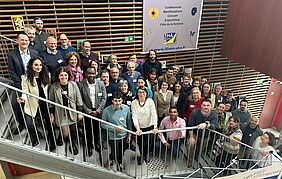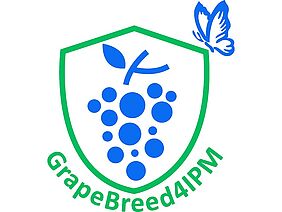According to the World Economic Forum and the European Union’s Biodiversity Strategy for 2030, biodiversity loss and ecosystem collapse are major threats facing humanity in the next decade. The massive use of chemical pesticides in agriculture is a significant contributing factor.
Dependency on chemical pesticides
Viticulture is one of the crops that is highly dependent on chemical pesticide applications, using approximately 60 % of the fungicides applied in the EU, and thus making it a priority target for reducing the use of chemical plant protection products. At the same time, grapevine is economically and culturally important in the EU, with wine and wine-based products being among the top three largest EU agri-food sectors for export.
Global involvement needed
Recent advances and new perspectives in grapevine breeding have opened the possibility for GrapeBreed4IPM ("Developing sustainable solutions for viticulture through multi-actor innovation targeting breeding for integrated pest management") to address the reduction of fungicides and preserve biodiversity. Lessons learned from previous experiences in viticulture have shown that in order to successfully improve sustainability, the global involvement of all actors is needed. For this reason, some of the main European research groups in viticulture have joined forces and are participating in this project with a multi-stakeholder and co-design approach to obtain the best knowledge and achieve maximum impact.
Robust varieties and consumer acceptance
The project will develop grapevine varieties with resistance to relevant diseases, adapted to local environmental, soil and climatic conditions, and with the goal of reducing reliance on pesticides. On the other hand, the project will also study consumer acceptance of this type of resistant varieties, which are relatively new and their wine less known so far, compared to traditional varieties. In addition, the project will provide farmers, winegrowers and advisors with best practices and guidelines for integrated pest management for a more environmentally friendly and sustainable viticulture in Europe.
The project’s objectives
This project has five distinct objectives:
- Co-design a common vision from actors of the value chain and coordinate cross-regions.
- Conducting research to provide a better understanding into the molecular basis of susceptibility and resistance to grapevine pathogens and the grapevine´s interactions with the environment.
- Participatory cross-breeding of new and diverse disease resistant varieties.
- Conducting research towards breeding for innovative disease resistance varieties without changing the characteristics of wines.
- Designing and disseminating tools and best practice guidelines.
FiBL’s role in the project
Associated partner FiBL Switzerland will support the project in co-designing a common vision from actors of the value chain. For the best practice guidelines, FiBL Switzerland is the task leader. Additionally, the institute will carry out variety testing on site and on farm as well as develop and test forecasting models.
The project is supported by the European Union as part of the Horizon Europe funding programme (No. 101132223) and by the Swiss State Secretariat for Education, Research and Innovation SERI (No. 22.00155).
Further information
Contact
Links
- cordis.europa.eu: GrapeBreed4IPM in the CORDIS database
- environment.ec.europa.eu: The EU's Biodiversity strategy for 2030





